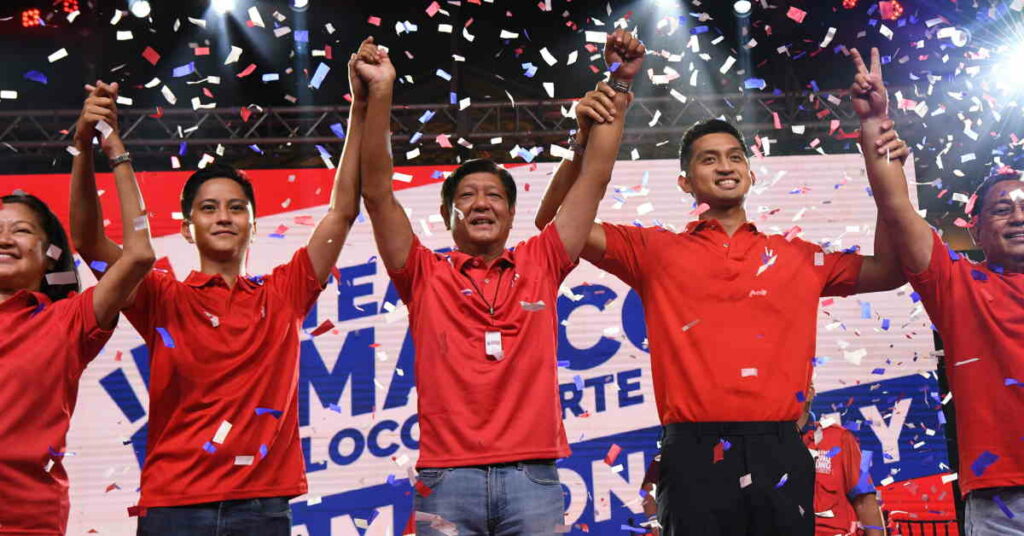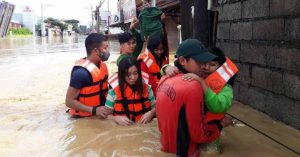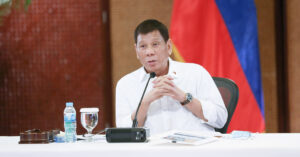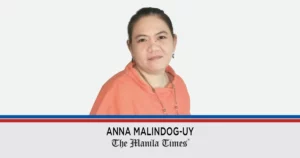
There are roughly eight days left before D-Day, when around 67 million Filipino voters will exercise their right to suffrage and choose a successor to President Rodrigo Duterte. Among the presidential and vice-presidential aspirants, former senator Ferdinand “Bongbong” Marcos (BBM) and Davao City Mayor Sara Duterte-Carpio of the UniTeam are way ahead of their rivals.
The support for the UniTeam’s standard-bearers has been consistent even before the official campaign period. Based on the latest poll survey conducted by the Laylo Research group held from 14 to 20 April, 2022, Marcos garnered 64 percent voting preference from the respondents, while his closest rival, Vice-President Leni Robredo, got 21 percent voting preference.
Marcos numbers even mounted three percentage points higher from his March survey polls feat of 61 percent, bequeathing him a 43 percentage points lead ahead of Robredo. Also, based on survey polls, Marcos has dominated all major voting areas across the Philippines.
Whereas, Duterte-Carpio, the running mate of Marcos, also maintains her lead with 62 percent of voters’ preference for the vice presidency over her closest rival, Senate President Vicente “Tito” Sotto, who garnered 18 percent voting preference.
Survey polls have time and again yielded similar results across various polling firms like Pulse Asia, OCTA Research, Social Weather Stations, and Publicus Asia over the last three months, pointing to one thing, and that’s the frontrunners of the upcoming 9 May, 2022 elections are Marcos and Duterte-Carpio.
Marcos and Duterte-Carpio are predicted to win a landslide. It is even likely that both will emerge as “supermajority” president and vice-president, which is thus far unprecedented in the history of electoral politics in the country. Marcos and Duterte-Carpio have withstood and maintained an overwhelming and undefeatable lead ahead of their closest rivals.
Why BBM And Sara?
Some of the factors that could explain an impending landslide victory for BBM and his running mate Duterte-Carpio are, first and foremost, the solid backing of the combined forces of the passionate, loyal, and solid Marcos loyalists and Duterte supporters across the country. The “solid north-south” factor matters a lot in the impending triumph of the Marcos-Duterte ticket.
Furthermore, the UniTeam has been endorsed and backed by almost all major and minor political parties and even regional political parties. Powerful religious groups other than the Catholic church, which can deliver command votes, have bet on the UniTeam’s standard-bearers. Marcos and Duterte-Carpio also have the support of many, if not a majority of local officials countrywide.
Moreover, it is also noteworthy to point out that many Filipino voters, including those living and working abroad, gravitate towards BBM and Sara because of their call for unity among Filipinos across classes, political colours, and orientations amid the many problems the country is faced with, including combatting the ever-present threats posed by the COVID-19 pandemic.
Also, the Marcos-Duterte-Carpio tandem is perceived to continue, pursue and build on the legacies of outgoing President Duterte, something that a majority of Filipinos clamour for.
Most importantly, the majority of Filipinos are drawn and attracted to BBM and Sara because of their positive and issues-based style of campaigning against the usual mudslinging among candidates during elections.
The UniTeam campaign style and strategy are a breath of fresh air for many Filipinos who are tired of backward politics and negative campaigning, which have been practiced since time immemorial.
Why BBM And Not Leni?
But then again, for some Filipinos, and even for other nationalities, it is a wonder why BBM maintains his leading advantage against his closest rival, Leni Robredo, despite all the black propaganda and demonization of BBM’s persona staged by his political detractors, bashers and the anti-Marcos factions in the country?
Probably there are many answers to this question. But for someone like me who does not even consider myself a Marcos loyalist but supports BBM nonetheless, the simple reason he is the candidate to vote for is that he is simply the rational choice.
BBM, vis-à-vis his closest rival, Robredo, is the most viable candidate for the highest position in the land. He is the most qualified candidate for the presidency and has a solid track record in governance, leadership, and public service. Someone who has a real grasp of local and international politics and a deep understanding of the real plight of the Filipino people.
Speaking of his track record as a public servant, BBM has more or less 30 years of experience in public service. He was governor for 12 years. Three (3) years as vice-governor, six (6) years as a member of the House of Representatives or Congressman, and six (6) years as a senator.
As a legislator, he has 54 bills enacted into law, and he has passed around 372 bills and resolutions as the author, co-author, sponsor, and co-sponsor. As a member of Congress, he occupied several committees as chairman, like the Committee on Local Government; Committee on Urban Planning, Housing and Resettlement; and the Committee on Public Works and Highways.
Some of BBM’s noteworthy legislative measures passed into law that until now serve the Filipino people are the: (1) Establishment of the Youth Commission; (b) Basic Law for Bangsamoro Autonomous Region or Senate Bill 2844; (c) Expanded Senior Citizen Act; (d) PAGASA Modernization Act; (e) Cyber Crime Law; (f) National Insurance Act Amendment and many others.
As a local executive, he established numerous processing and storage facilities for the agricultural produce of his province. He was also able to upgrade his province’s basic services (i.e., water, power, and transport) and put up the first wind farm in Southeast Asia, the Bangui Windmills.
When BBM was serving as local chief executive of his province, under his administration, his province received numerous awards, and these include; (a) Top Achiever in Region 1 on Food Security in 2000; (b) Best Performing Province in Terms of Rice Productivity-Nationwide in 2001; and (c) Best Recommended Tourist Destination Award in 2002.
Even when BBM was not occupying a position in government, he did not stop being a public servant. Amid the COVID-19 pandemic, he continued to serve the Filipino people through his humanitarian work and public service using his resources.
For instance, he extended PPEs to 413 locations across the country, distributed tablets to students in 16 provinces, and distributed goods to various community pantries. He organised various medical missions, outreach projects, and relief operations across 38 provinces and cities.
Compared to BBM, I am not sure if Robredo has done something concrete for the country that really made a dent and changed the lives of Filipinos in a meaningful way, even in her province and locality. Track-record-wise, it is evident that Robredo lags behind BBM.
On foreign policy, compared to Robredo, I see BBM as a strong and independent-minded leader who will most likely devise, conceive, and pursue an independent foreign policy just like President Rodrigo Duterte amid the reality that the country faces the mounting challenge of positioning and navigating through the challenging and changing geopolitical arrangements, structures, and realities in the Asia Pacific region and even beyond while securing and preserving the Philippines’ national core interests, freedom, and independence while ensuring that it has good, friendly, and peaceful relations and cooperation with superpowers like China, the United States, Russia, and others.
Thus far, BBM is not within the ambit of US influence or control compared to his closest rival. BBM is the only candidate who will pursue a more balanced foreign policy between the US and China. He is the only presidential candidate thus far who will take a pragmatic approach to maintain friendly relations with China while at the same time pursuing a peaceful and diplomatic resolution to the conflict of interests in the disputed South China Sea between the two countries vis-à-vis other claimant-states, which is the way forward for the Philippines.
Furthermore, compared to Robredo, I see BBM as a leader who will continue the fight against illegal drugs and local insurgency, and the terroristic acts of the CPP-NPA. Filipinos, at this point, want a leader who will seriously build on the successes of the current administration and continue the fight against the communist insurgency until peace and development in the countryside are achieved.
Conclusion
Expectations-wise, the majority of Filipinos will most likely vote for BBM and Sara over their rivals in the upcoming elections. For many Filipinos, BBM and Sara are the rational and most pragmatic choices for the top two highest positions in the land.
Indeed, the Philippines needs wise, well-educated, well-rounded, able, strong-willed, compassionate leaders and a new set of leaders who will continue the legacy and build on the current administration’s successes for the sake of continuity.
Source: The ASEAN Post
https://theaseanpost.com/opinion/2022/may/01/philippines-elections-why-bbm-not-leni



